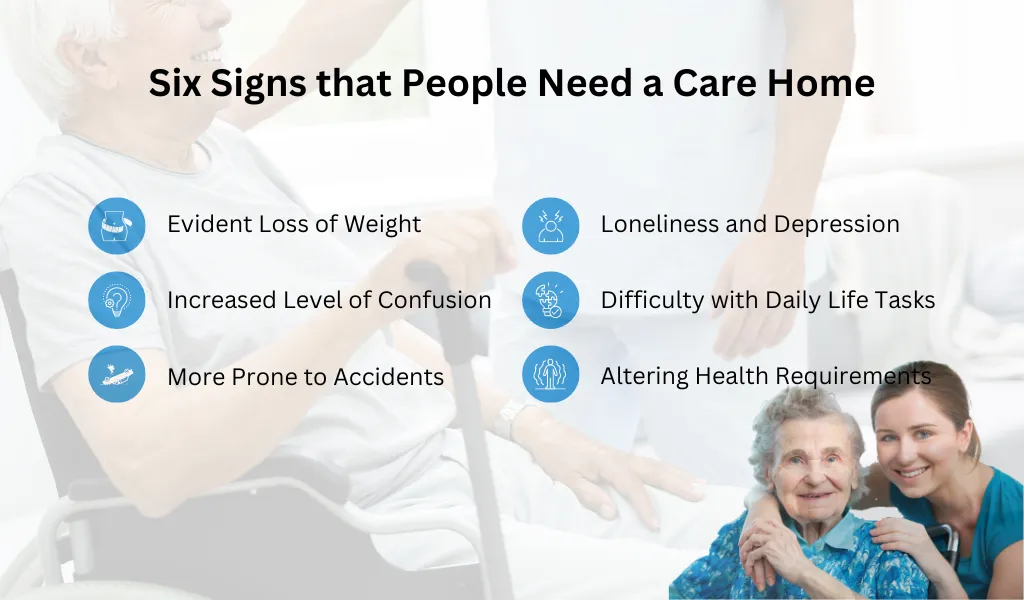You can gain access to care services for you or your loved ones in two ways. One option is to move into residential care and the other into nursing care. Through care homes, the elderly people receive services according to their changing needs. With time, a person’s needs can increase, or even decrease. Therefore, a care home has skilled and knowledgeable staff. The question is what is the difference between nursing home and care home is?
First, let’s define them both.
What are Nursing Homes in the UK?
Registered Nurses, along with support from Care Assistants, provide care around the clock in nursing homes.
What is included in nursing care? Well, it includes intravenous medication, medical intervention, and wound care. There are nursing homes with specialisation in certain health conditions. For example, learning disabilities, physical disabilities, dementia, cancer, or mental illness.
Suppose your loved one has dementia. Then, you can move them into a specialist nursing home. This nursing home is fully equipped to take care of them, even in the advanced stages of dementia. They have the required treatment and facilities to meet their needs as per their illness.
In case you require nursing care, you may get the nursing care component of your care home fees paid for by the NHS. This is called NHS-funded nursing care or FNC.
NHS full pays your nursing home fees if you are eligible for NHS Continuing Healthcare Funding, or CHC. Hence, you should know the difference between nursing home and care home.

What are Care Homes in the UK?
You have probably heard people refer to care homes as residential care homes. These are the most standard type of care homes. Healthcare Assistants or HCAs provide personal care around the clock in residential care homes. They are trained care assistants.
Elderly people who cannot live independently usually reside in residential care homes. Such residents may need support with daily tasks. For example, eating, washing, dressing, and even getting around.
It is quite common for such residents to have degenerative health conditions because of ageing.
Even if someone has a mental, physical, or learning disability, they do not necessarily require frequent medical treatment. They can live in a care home without it.
Nursing Homes Provide Residents with Which Services?
The purpose of nursing homes is to take care of people who cannot perform daily life tasks due to their medical conditions. They require regular treatment and care from professionals such as registered nurses.
Qualified care assistants provide support to nurses. They are trained to detect symptoms in residents. Also, they identify any changes in the residents’ conditions.
Nursing homes offer residential care 24 hours a day, 7 days a week. They are equipped to take care of people with complicated needs. Whether on a permanent basis or a temporary one, they provide personal care to their residents.
Therefore, nursing homes offer a higher level of care. Consequently, they are costly. In comparison to residential care homes, nursing homes cost about £180 more per week on average.
Although, NHS may pay for the nursing care component of your care homes fees in case you have nursing needs. It is best to learn more about NHS-funded nursing care, also called FNC.
Certain nursing homes have specialisation in specific health conditions. For example, dementia, cancer, mental illness, severe physical disabilities, or severe learning disabilities.
If your loved one suffers from dementia, they can still move into a residential care home. Please note that a specialist dementia nursing home can provide treatment and care for people with advanced stages of dementia. Therefore, it is important to know the difference between nursing home and care home.
Residential Care Homes Provide Residents with Which Services?
Anyone who needs help or support with their daily tasks due to their illness can move into a residential care home. Daily tasks include eating, dressing, and washing. However, they do not require nursing care. Both short-term and long-term basis are available.
Through visiting health professional or special care facilities some residential care home can provide nursing care. Yet, they are mostly for elderly people who cannot live independently. For example, they cannot manage medication, toileting, their personal hygiene, or have trouble with moving around.
The residents of residential care homes may suffer from a learning disability, or a physical disability due to old age. Yet, frequent medical treatment is not necessary.
Although the trained staff can provide daily support and care to the residents, they are probably not qualified to provide medical care. They can still administer medication.
Additionally, the residents can participate in social and physical activities. Moreover, they can host events and plan for trips.
To simplify, in comparison to a nursing home, a residential care home offers a lower level of care to residents. As a result, a residential care home is less expensive than a nursing home.
What is the Difference Between Nursing Home and Care Home?
Here are all the main differences between a residential care home and a nursing home in the UK:
Difference Number One: Care Needs
People who move into a residential care home require help with their personal care. They may need to take a break from their daily tasks. For example, cooking or cleaning.
On the other hand, people who move into a nursing home have medical needs. Therefore, professional nurses provide them with care 24 hours throughout the day.
Difference Number Two: Team Training
In a residential care home, experienced care assistants provide support to the residents in their daily tasks. These include everything from bathing and dressing to moving around. For example, partaking in activities and outings. The trained team makes sure to get to know the residents so they can cater to their specific needs. It is important to understand the difference between nursing home and care home.
Whereas, in a nursing home, skilled nurses provide residents with personal care. They have experience in providing various in-depth medical services. Which means that if your loved one requires change, they can stay in the same home. Nursing homes create a bespoke care plan by undertaking a care assessment.
Difference Number Three: Cost
The cost of living in a residential care home varies according to the needs of your loved one. Nevertheless, they still cost less than a nursing home.
While in a nursing home, the cost depends on the amount of care an individual needs. Therefore, nursing homes are more expensive. Residents living there need more specialised facilities and support. Although, residents can receive Funded Nursing Care (FNC). It is best to know what affects the costs of living in a nursing home.
| Residential Care Home | Nursing Home |
| Less costly | More costly |
| Experienced care assistants | Skilled nurses |
| Personal care (daily tasks) | Medical care (specialised in conditions) |

Six Signs that People Need a Care Home
There are different reasons behind people needing care of home services. Although some people can continue to live independently in old age, most people need extra support. Health conditions or illnesses may make it difficult for people to live on their own. Therefore, a nursing home or care home is necessary for their well-being. Following are some signs to look out if you are worried about a loved one or yourself:
1. Evident Loss of Weight
Suddenly, losing weight is probably an indication of an illness. However, sometimes a person is not eating enough. This is either because they are not well, or they cannot prepare food for themselves. Perhaps they cannot shop or cook safely.
In certain cases, weight loss can mean the onset of dementia. If you notice that an elderly relative of yours has lost weight, then consult your GP. They can offer support and advice in such a scenario. Therefore, you should know the difference between nursing home and care home.
2. Increased Level of Confusion
In case you notice that an older person in your family is often forgetful or usually confused, it is probably a sign that they cannot live independently. They require help with personal care tasks. It is ideal to reach out to your local authority. They will help you by carrying out a care needs assessment. Then, they can show you the options you have available.
3. More Prone to Accidents
In a lot of situations, if an elderly person suffers from a fall, they cannot live independently. There is data from the UK government that indicates that this is the most common reason for elderly people to reside in care homes. If an elderly relative of yours falls, it can lead to a stay in the hospital. As a result, other issues can come forward that otherwise remained hidden.
Falls are not the only type of accidents that can happen, obviously. Other examples include tabs left running, forgotten food in the oven, or a hob left on, are all signs that you should worry about. They may need residential care or some form of support in this condition.
4. Loneliness and Depression
The Age UK’s All the Lonely People report states a prediction that by 2026, two million over-50s will end up lonely. There is continuous growth in the UK’s ageing population. The actual figure can go higher because of the pandemic. A person can end up in depression because of loneliness as it heavily affects their well-being.
Charities such as Samaritans help those who cannot live alone. So, if you or a loved one are struggling, they can reach out. Yet, it is still important to consider your circumstances, or theirs, and think about the benefits of living in a nursing home. You will have company and the staff will take care of you. Moreover, you will have personal space. Thus, you should understand the difference between nursing home and care home.
5. Difficulty with Daily Life Tasks
If you or a loved one struggle with daily tasks, then moving into residential care is a good idea. Daily tasks include bathing, dressing, cleaning, and moving around. By moving into a care home, you can get all the support you need. You no longer need to struggle with everyday things as you get older.
6. Altering Health Requirements
Changing health needs can lead to the requirement of additional care. For example, receiving ongoing treatment, requiring administration of medication, or even the inability to change your own dressings. If you have mobility issues, then it is best to consult with your GP or local authority. Such issues may indicate that you require extra support.
When Is It Best to Consider Nursing Care as an Option?
You already know nursing care provides support through personal care. This includes shaving, bathing, and dressing. Furthermore, it involves administering medication. You can get access to nursing care temporarily. In a situation where you are recuperating from a hip replacement is an example as such. Or in case your spouse cannot take care of you during an illness. There are some people who need nursing care 24/7. For example, elderly people, people with learning disabilities or physical disabilities. Thus, you should comprehend the difference between nursing home and care home.
Nursing home is full-time residential facilities that always have qualified nurses onsite. Sometimes live-in carers take care of people in their own homes. Although, this is not an option for everyone. This is because it needs massive home modifications.
Reach out to your local authority or GP to find out about NHS-funded nursing care. You may qualify for it. In such a case, your local clinical commissioning group (CCG) will help you. This way, you will receive ease with the cost of nursing care.
The Advantages of Obtaining Access to Care Services?
Undoubtedly, the process of moving your loved one into a care home is overwhelming. Nevertheless, it comes with plenty of benefits for both you and the person moving in. Consider the following advantages of accessing care services:
Less Responsibility and Stress
In a scenario where your loved one moves into residential care, then you get more quality time with them. The carer-patient relationship shifts. Therefore, you have less stress and responsibility. You can focus on spending time and making memories together.
Elderly People Have Company
If your loved one was previously suffering from loneliness, then moving into a care home is good for them. They will have more companionship in a care home. It is an opportunity for a fresh start as they get to meet new people, such as residents and staff. Hence, it is necessary to know the difference between nursing home and care home.
Good Sustenance
You can rest assured that your loved one is eating properly. There is no need to worry about their meals. They are surely eating a balanced diet to remain healthy. Therefore, care services are beneficial for you and your loved ones.
More Mental Peace
It is a relief for relatives, friends, and neighbours to know that trained professionals are looking after your loved ones. At first, you may find it strange. Nevertheless, if anyone can take care of them after you, it is a professional caretaker. Therefore, you must understand the difference between nursing home and care home.
Conclusion
To conclude, as people age, they require more care. In fact, they suffer from various illnesses, which need medical attention. Undoubtedly, living alone is not possible for them in such conditions. Nursing home and residential care homes provide residents with support and personal care. There are differences between the two types of care homes. It is important to understand them so that you or your loved one can get the required care. Make sure to contact your GP or local authority for more information.








